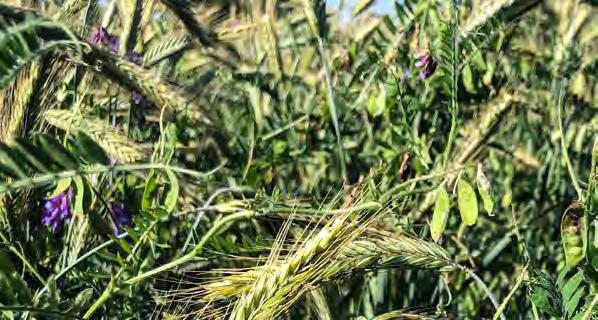
2 minute read
CEO'S REVIEW
During 2018/19, we have continued our strong focus on sustainable farming, enhanced by our new goal of all Ingleby farms and forests becoming synthetic pesticidefree by 2030.
ALWAYS SAFETY FIRST
The safety and well-being of our employees is our highest priority. In 2018/19, we had no fatal accidents and thanks to our teams’ continued focus on safety, we have reduced the number of accidents by 33% from 2017/18. In addition, our lost time injury frequency rate in 2018/19 was 50% below our peer benchmark. But even one accident is one too many, and we will continue focusing on health and safety in 2019/20.
NATURAL, HEALTHY FOOD
Due to the technological and industrial development driven by rapid urbanisation, it has become a trend for many food businesses to move away from the natural agricultural systems, and use the latest revelations of complex food engineering in artificial production systems. We believe there will always be a demand for natural food grown outside in the soil and under the sun. Our constant focus on healthy soils and best environmental practices will ensure production, trust and demand for healthy and nutritious food from living Ingleby farms.
SYNTHETIC PESTICIDE-FREE
In November 2018, we set a goal of becoming synthetic pesticide-free by 2030. This might seem ambitious, but we believe it will become a minimum requirement to farm sustainably by 2030.
Our teams have embraced this challenge with enthusiasm and dedication, and they are investigating new and innovative ways of farming. In many ways, our 2030 goal has revitalised Ingleby. It is not only about removing synthetic pesticides from our farms, it is also about long-lasting regenerative agriculture and horticulture principles.
Going forward, we aim to always grow seven to nine crops with maximum soil cover on each farm, as well as having green manure crops supported by companion cropping, where several crops grow in the same field at the same time. We will also only raise pasture-fed livestock. All this will support our long-term efforts of enhancing the biodiversity on our farms.
Our soils must always be covered by a crop, which enhances soil microbiology and biodiversity,
Companion crops of hairy vetch and rye, Latvia. Photographer: Rasmus Juul Christoffersen

maximises CO2 sequestration and provides climate change resilience.
NEW INGLEBY GOALS
Based on the positive responses and innovation generated by our 2030 goal, I believe we should set further ambitious goals in Ingleby. One new goal is having zero-waste by 2025. This means that every single item used in production must be compostable, reusable, or recyclable. This will need the support of our suppliers, and we will begin the work in 2020.
Another new goal is to become climate positive. Greenhouse gas emissions and climate change are topics high on the global agenda, but the currently available greenhouse gas calculations are fragmented and lack validated documentation. Today, product and service providers declare their own non-consolidated part of the calculation, causing widespread misinformation and the risk of emissions not being accounted for. The world needs a widely acknowledged framework and international rules for greenhouse gas emission calculations, which takes into account full life-cycle emissions for any product or human action. We believe that our land use, with vast grasslands, regenerative agriculture, forests, habitats and setasides, will help sequester more carbon than we emit, resulting in Ingleby being overall climate positive by 2030. In the coming years, we will intensify our research into life cycle carbon calculations while actively working to minimise our carbon emissions.
Hans Henrik Koefoed Chief Executive Officer










